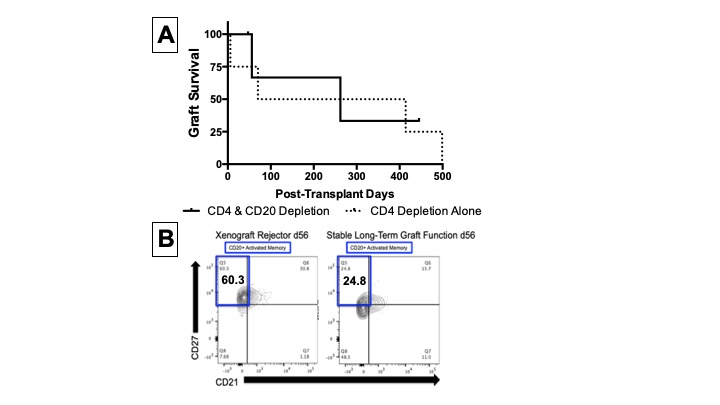Transient Cd4+ T Cell and Cd20+ B Cell Depletion Leads to Prolonged Pig-To-Primate Kidney Xenograft Survival
1Emory University School of Medicine, Atlanta, GA, 2University of Miami, Miami, FL
Meeting: 2020 American Transplant Congress
Abstract number: 96
Keywords: B cells, Kidney transplantation, Primates, Xenoreactive antibodies
Session Information
Session Time: 3:15pm-4:45pm
 Presentation Time: 3:15pm-3:27pm
Presentation Time: 3:15pm-3:27pm
Location: Virtual
*Purpose: “Delayed” antibody-mediated xenograft rejection is the one of the most important obstacle to clinical application of pig organ xenografts. The aim of this study was to assess the impact of B cell depletion on kidney xenograft survival.
*Methods: Rhesus macaques (n=8) with low pre-transplant xenoreactive antibody titers were selected following recipient screening. Selected recipients underwent bilateral nephrectomy and life-sustaining porcine renal xenotransplantation using GGTA1 KO/CD55 transgenic donor pigs. Animals received induction immunosuppression with either CD4 depletion alone or combination CD4 and CD20 depletion; all recipients received maintenance immunosuppression with anti-CD154 plus mycophenolic acid and steroids.
*Results: Recipients treated with anti-CD4 induction therapy (n=4) with anti-CD154 experienced prolonged xenograft survival (MST=242 days). Addition of B cell depletion was associated with similarly prolonged survival, with all recipients surviving >50 days. There were no episodes of “delayed” acute graft rejection in the B cell depletion treatment arm, while the CD4-depletion alone treatment arm had one early rejection event. Circulating B cells were effectively depleted with a single dose of anti-CD20 therapy; reconstitution of circulating B cells occurred approximately 6-weeks post-transplant. Rejection events post-CD20 reconstitution demonstrated a predominant activated memory B cell phenotype (CD20+CD27+CD21-) with IgM predominance; stable graft function was associated with a predominant resident memory B cell phenotype (CD27-CD21-). Assessments of de-novo xenoreactive antibody development among recipients treated with B cell depletion are ongoing.
*Conclusions: The combination of low pretransplant anti-pig antibody and CD4 depletion with and without CD20 depletion resulted in consistent, long-term xenograft survival. Further evaluation of the B cell phenotype and the B cell contributions to xenoreactive antibody is crucial for understanding xenograft rejection and pathways for clinical translation of xenotransplantation.
To cite this abstract in AMA style:
Lovasik BP, Matar AJ, Faber DA, Mathews DV, Breeden C, Kim SC, Tector AJ, Adams AB. Transient Cd4+ T Cell and Cd20+ B Cell Depletion Leads to Prolonged Pig-To-Primate Kidney Xenograft Survival [abstract]. Am J Transplant. 2020; 20 (suppl 3). https://atcmeetingabstracts.com/abstract/transient-cd4-t-cell-and-cd20-b-cell-depletion-leads-to-prolonged-pig-to-primate-kidney-xenograft-survival/. Accessed July 9, 2025.« Back to 2020 American Transplant Congress

